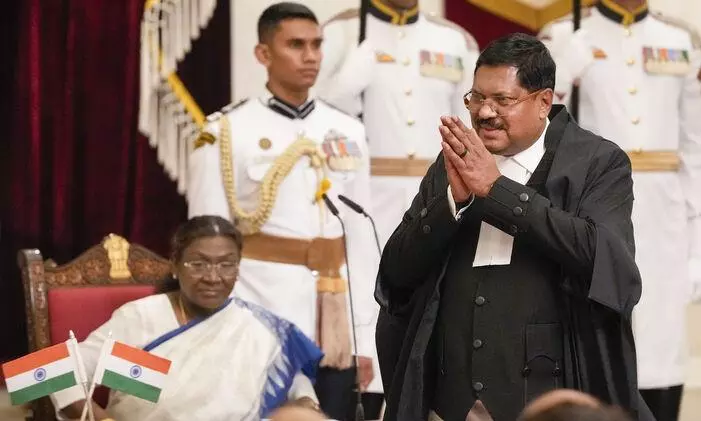
President Murmu flags overreach, poses 14 queries to SC on Governors’ powers
The questions are with reference to the recent judgement setting a timeline for Governors' and the President’s assent to bills, and the SC's powers under Art 142

President Droupadi Murmu, in an unprecedented move, is reported to have sought the Supreme Court’s opinion on a list of 14 questions related to the apex court’s powers and especially with reference to the recent SC judgement setting a timeline for the Governors and President’s assent to bills.
President Murmu is believed to have raised these questions on Tuesday (May 13), a day before Chief Justice of India BR Gavai took office, according to media reports.
TN Governor case
On the landmark ruling by a two-judge bench in the Tamil Nadu Governor case, the President has used the powers conferred under Article 143 of the Constitution to ask the top court its opinion on the question: How can the Supreme Court put a timeline when the Constitution does not?
Last month, the SC used its extraordinary powers under Article 142 to set a deadline for the President of India and the Governors of states in giving assent to bills passed by state assemblies.
Also Read: SC slams TN Governor, says withholding 10 Bills for President’s nod is ‘illegal’
The court also cleared 10 Bills that were passed by the TN Assembly and were withheld by the Tamil Nadu governor. It’s the first time that bills have been cleared without the assent of the governor or the president.
The President challenged the court's ruling that introduced the idea of "deemed assent" to Bills that remain pending with Governors or the President beyond a specific period of time. She emphasised that neither Article 200 (governing Governors) nor Article 201 (governing the President) prescribe any time limit or procedural mechanism for granting or withholding assent to Bills passed by state legislatures.
Vice-President Jagdeep Dhankhar had questioned this judgement, and called it a case of “judicial overreach”.
President Murmu’s questions
The 14 questions that President Murmu has reportedly sought the opinion of the Supreme Court on are:
1. What are the constitutional choices available to a Governor under Article 200 upon receiving a Bill?
2. Is a Governor required to act solely on the aid and advice of the Council of Ministers when dealing with such Bills?
3. Can the Governor's discretion under Article 200 be subject to judicial scrutiny?
4. Does Article 361 completely shield a Governor's decisions under Article 200 from court review?
Also Read: SC's timeframe on Bills: Centre likely to file review petition
5. In the absence of express timelines in the Constitution, can the judiciary impose time limits on Governors for acting on Bills?
6. Can the President's discretion under Article 201 be judicially reviewed?
7. Is the President bound by judicially prescribed timelines in the absence of constitutional mandates?
8. Must the President necessarily seek the Supreme Court's opinion under Article 143 when a Bill is reserved by a Governor?
9. Can courts intervene in decisions by the Governor or President before a Bill becomes law?
10. Is it permissible under Article 142 to override or substitute decisions of the President or Governor?
Also Read: In a first, SC sets three-month deadline for President to decide on bills
11. Does a Bill passed by a state legislature become law without gubernatorial assent?
12. Should constitutional interpretation questions first be referred to a Constitution Bench under Article 145(3)?
13. Does Article 142 extend beyond procedural matters to allow rulings that contradict existing laws or constitutional provisions?
14. Can Centre-state disputes be resolved outside Article 131, which provides for exclusive SC jurisdiction?
Constitution Bench
Chief Justice of India Gavai will now be required to set up a Constitution Bench comprising five or more judges to consider the 14 questions posed by President Murmu and to render its opinion.

